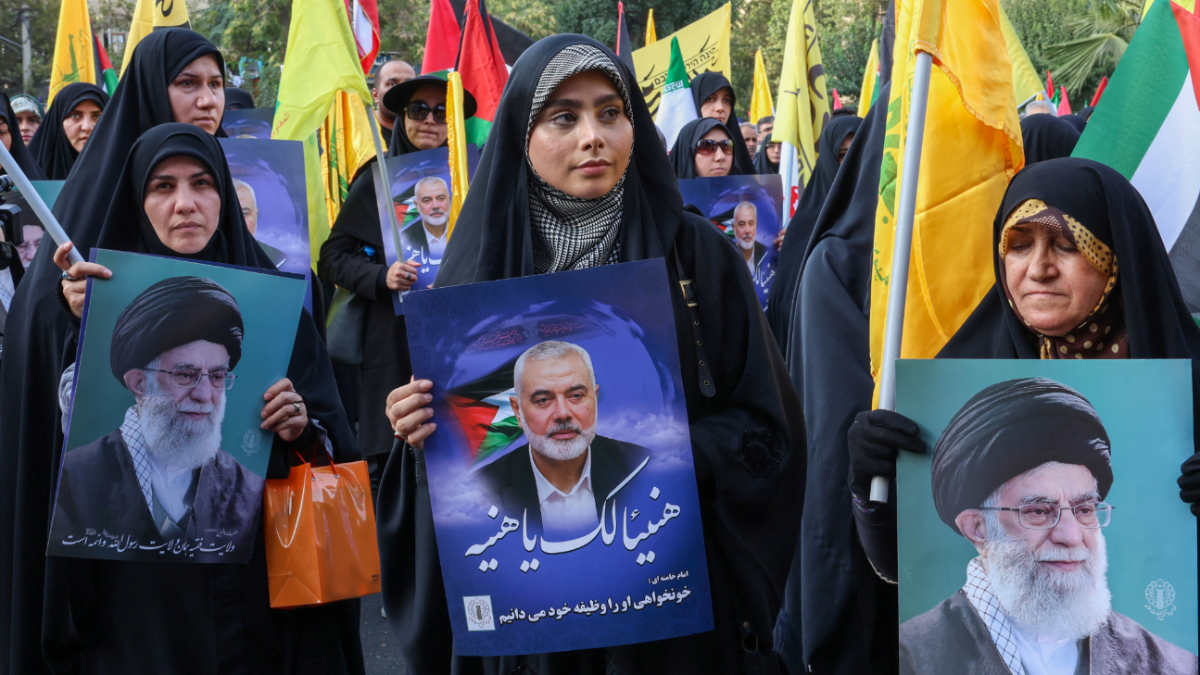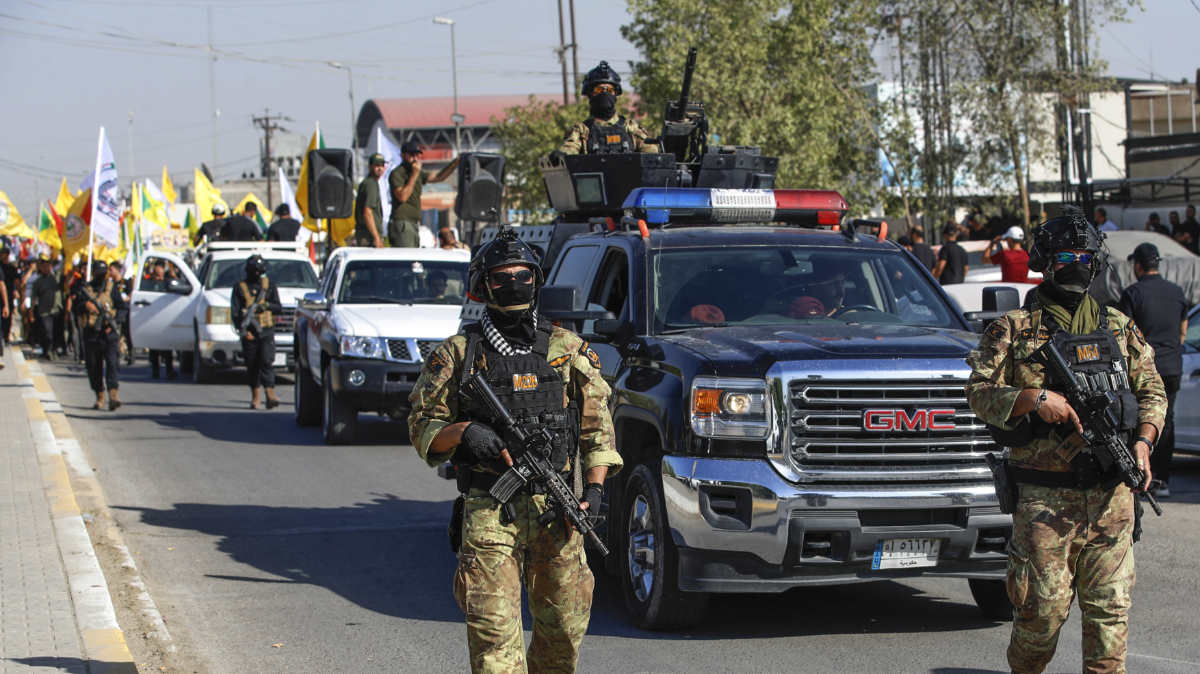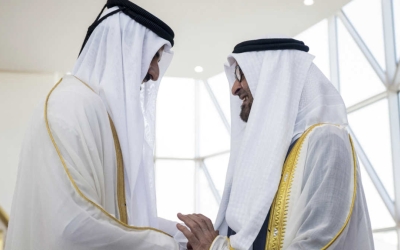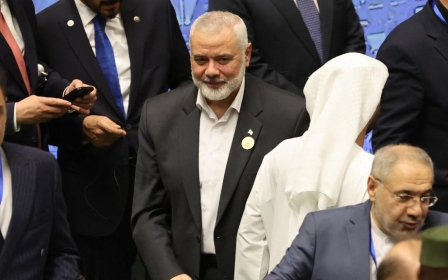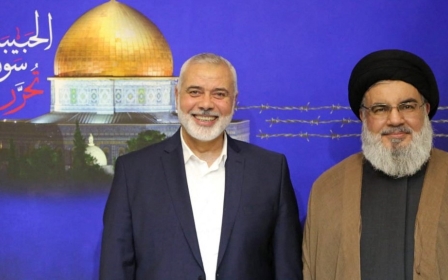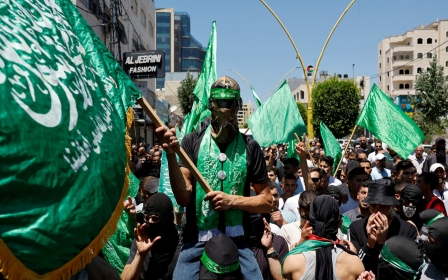Ismail Haniyeh killing plunges Biden diplomacy into chaos but shows Iran's vulnerability
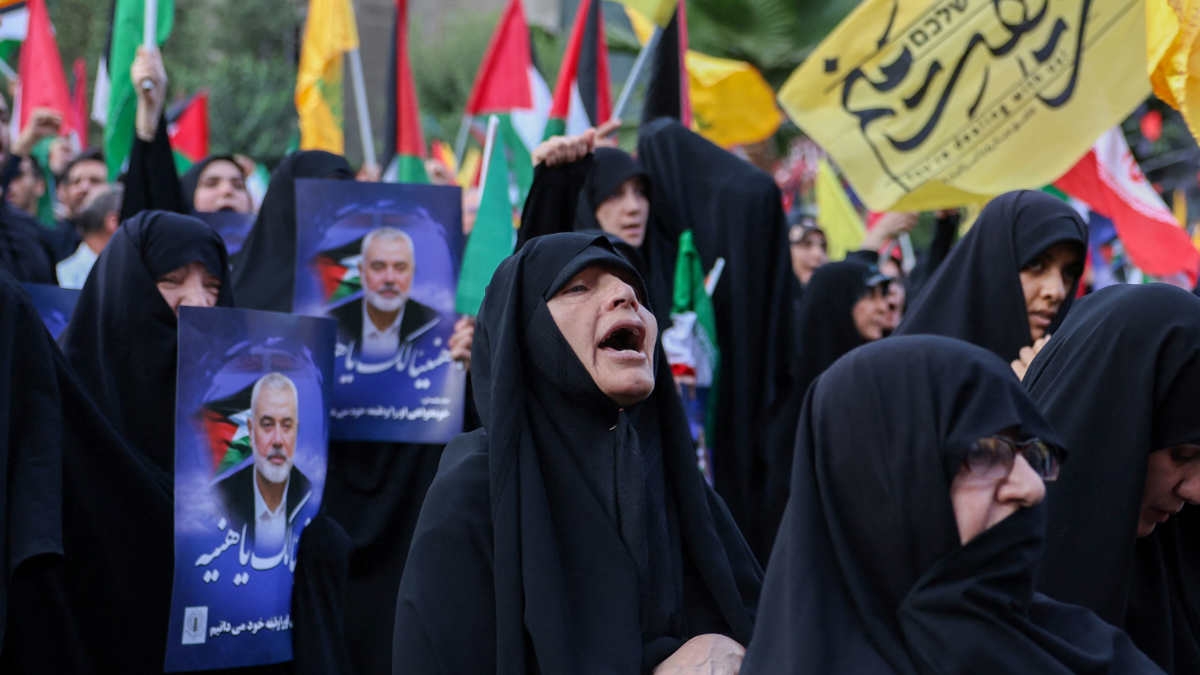
The killing of Hamas leader Ismail Haniyeh in Tehran has thrust the US into the thorny position of scrambling to prevent a regional war from erupting after the assassination exposed the vulnerability of its most potent Middle Eastern foe: Iran.
Iran and Hamas blamed Israel for Wednesday's brazen assassination of Haniyeh, who was in Tehran for the swearing-in of Iran’s new president, Masoud Pezeshkian. The strike came hours after Israel said it killed senior Hezbollah commander Fuad Shukr in Beirut.
After 10 months of Israel's war on Gaza, Biden administration officials are now seasoned at the diplomatic cleanups necessitated by Israeli missile and drone strikes in Middle Eastern capitals.
Secretary of State Antony Blinken quickly distanced the US from the strike, saying: "This is something we were not aware of or involved in.”
Israel has ramped up its shadow war with Iran since 7 October when the war in Gaza broke out, with many analysts and diplomats saying Prime Minister Benjamin Netanyahu appears to be openly courting a wider war.
New MEE newsletter: Jerusalem Dispatch
Sign up to get the latest insights and analysis on Israel-Palestine, alongside Turkey Unpacked and other MEE newsletters
The US was able to brush off Israel’s killing in January of senior Hamas official Saleh al-Arouri in Beirut. The next spike in regional tensions saw the US flex its air defence capabilities, shooting down drones and missiles Iran fired in a choreographed attack on Israel in response to its strike on its consulate in Damascus, Syria.
But the last 24 hours have thrust the US and its ally into uncharted territory.
While the Hamas leader is not an Iranian official like those killed in Damascus, his assassination in the heart of Tehran is a humiliating blow to Iran’s power projection, particularly the Revolutionary Guard Corps.
The attack flies in the face of one of the Biden administration’s stated goals since 7 October, which is to prevent Israel's war on Gaza from seeping out beyond the enclave. The US is also working on stalled ceasefire talks it hopes will end the war and allow for post-war Gaza governance planning with Gulf states to progress.
“I am 100 percent sure US officials right now are super angry about Israel’s behaviour. This is not something that advances their goals,” Randa Slim, a senior fellow at the Washington-based Middle East Institute, told MEE.
Haniyeh, who was based in Doha, Qatar, was considered a moderate member of Hamas, more open to a ceasefire compared to the group’s Gaza chief, Yahya Sinwar.
The US, meanwhile, is helping Israel to find and kill Sinwar, MEE previously reported.
But Haniyeh, who often jetted between regional capitals, was the group’s main interlocutor with Arab officials, Israel and the US.
'The credibility of the US as a guarantor of a future ceasefire deal is dead'
- Randa Slim, Middle East Institute
Egypt’s foreign ministry said his killing “undercuts the strenuous efforts made by Egypt and its partners to stop the war in the Gaza Strip.” Qatari Prime Minister Sheikh Mohammed Bin Abdulrahman al-Thani was more blunt: “How can mediation succeed when one party assassinates the negotiator on the other side?”
Practically speaking, Israel’s war on Gaza has become the sort of regional conflict the US wanted to avoid, albeit with a low-key tempo.
Houthi rebels in Yemen have declared war on commercial shipping in the Red Sea, in what they say is solidarity with besieged Palestinians in Gaza. Amid Israeli and US air strikes, they have won concessions from Saudi Arabia and are eyeing support from Russia, which MEE revealed wants to provide them with cruise missiles.
Meanwhile, the US’s military posture in the Levant is being squeezed.
Jordan’s US-backed monarchy is under pressure from the majority of its population with Palestinian roots. In Syria and Iraq, Bashar al-Assad and Iranian-backed Shia militias appear closer than ever to expelling US troops from the region. And in impoverished Lebanon, Hamas is enjoying unprecedented support among Sunni Muslims, MEE reports.
Iran has also been welcomed back into the fold of regional diplomacy by Saudi Arabia.
However, some analysts say that Israel’s actions over the last 24 hours reveal that Iran’s gains are more fragile than many commentators in the West and the Middle East admit.
'Win for the US'
“This is a win for the US,” James Jeffrey, chair of the Wilson Center's Middle East programme and a former US ambassador, told MEE about the strike on Tehran.
Haniyeh, who headed a US-designated terror group, was never a US target. Hamas is an Islamist and Palestinian nationalist group made up predominantly of Sunnis, but along with Yemen’s Houthis and Lebanon's Hezbollah, it belongs to Iran’s so-called "axis of resistance", made up of mainly Shia groups.
'Iran looks weak right now. They can’t even protect their allies in their capital'
- James Jeffrey, Wilson Center
If Israel is able to strike Hezbollah officials in Beirut and not suffer similar retaliatory strikes in Haifa or Tel Aviv, it would effectively mean Israel has achieved some level of escalation dominance over Iran's most powerful proxy.
Likewise, Israel’s air strike on Haniyeh’s lodging inside Tehran follows a botched rescue mission for Iran’s former president, Ebrahim Raisi, which some say showed the effectiveness of western sanctions on Iranian industry.
“The US is achieving major victories as much as people don’t want to admit it because of the focus of the civilian deaths in Gaza,” Jeffrey added. “Poland, Taiwan, China, Russia are all looking at the US standing behind Israel after it bombed Tehran with US-supplied weapons.
“Iran looks weak right now. They can’t even protect their allies in their capital,” he said.
“The strike totally knocked Iran on its back heels,” an Arab official who has mediated between Iranian proxies and the US, told MEE.
The risk, of course, is that Iran feels its red lines are not being respected. Short term, that could mean an attack on Israel that the US must defend which is less telegraphed than in April.
“Tactical success does not always beget strategic victory…Iran, Hezbollah and Hamas’s responses [to the assassinations] will drive the direction of the Middle East for the coming weeks and months,” Jonathan Panikoff, director of the Atlantic Council’s Scowcroft Middle East Security Initiative and a former senior intelligence official, told MEE.
Iran could also double down on its nuclear option. Blinken said in July that Iran was likely “one or two weeks away” from producing enough fissile missile material for a nuclear weapon.
'Credibility dead'
The Biden administration’s immediate focus will be trying to salvage its two key goals: working towards a cease-fire in Gaza and preventing an all-out regional war that drags the US directly into conflict with Iran.
Slim, from the Washington-based Middle East Institute, said Haniyeh’s assassination was a severe blow to US efforts to reach a ceasefire deal, because one of Hamas’s key demands has been for assurances that Israel will not resume its attacks on Gaza - and the group - after hostages are released.
“There are two scenarios for what happened in Tehran: one is that the US was complicit in this assassination. The other is that the US wasn’t informed and had no role in the attack. Either scenario shows the US has no influence over Israeli action.
“The credibility of the US as a guarantor of a future ceasefire deal is dead,” Slim told Middle East Eye.
While Haniyeh was seen as more accommodating to an agreement, analysts say he still had to contend with Sinwar, who is believed to have launched the 7 October attacks alongside the Izz al-Din al-Qassam Brigades without coordinating with Hamas’s political bureau in Doha.
Panikoff said Haniyeh’s death would delay the talks but would not change the situation on the ground in Gaza driving Hamas’s calculations.
“Haniyeh was negotiating but the decision has always rested with Sinwar,” Panikoff told MEE.
“Sinwar calculates that for Hamas, continued civilian deaths are ultimately a net positive and has been more reluctant to agree to a ceasefire than others. The conditions on the ground don’t shift because of the assassination,” he said.
US assault ship moving
As the US anticipates Iran's retaliation, they hope to replicate their successful de-escalation diplomacy from April.
At the time, the US’s Gulf partners dragged their feet about participating in Israel’s defence, but the US and UK were ultimately able to defend Israel with the help of Jordan and scrambled fighter jets from Saudi Arabia and Qatar.
On Wednesday, Defence Secretary Lloyd Austin reaffirmed the US’s “unwavering commitment to Israel’s security and right to self-defence”, in a call with his Israeli counterpart, the Pentagon said.
According to open-source intelligence, the US is moving the USS Wasp-class, an amphibious assault ship, from the Greek island of Crete towards Lebanon. The nuclear-powered USS Theodore Roosevelt aircraft carrier is operating in the Persian Gulf.
Back-channel talks between the US and Iran in Oman had recently deescalated tensions, but last week US troops in Syria and Iraq came under renewed attack.
On Tuesday, the US said it launched a “defensive strike” in Iraq. Austin told reporters the strikes on US troops were “connected” to fighting between Israel and Hezbollah.
Middle East Eye delivers independent and unrivalled coverage and analysis of the Middle East, North Africa and beyond. To learn more about republishing this content and the associated fees, please fill out this form. More about MEE can be found here.


